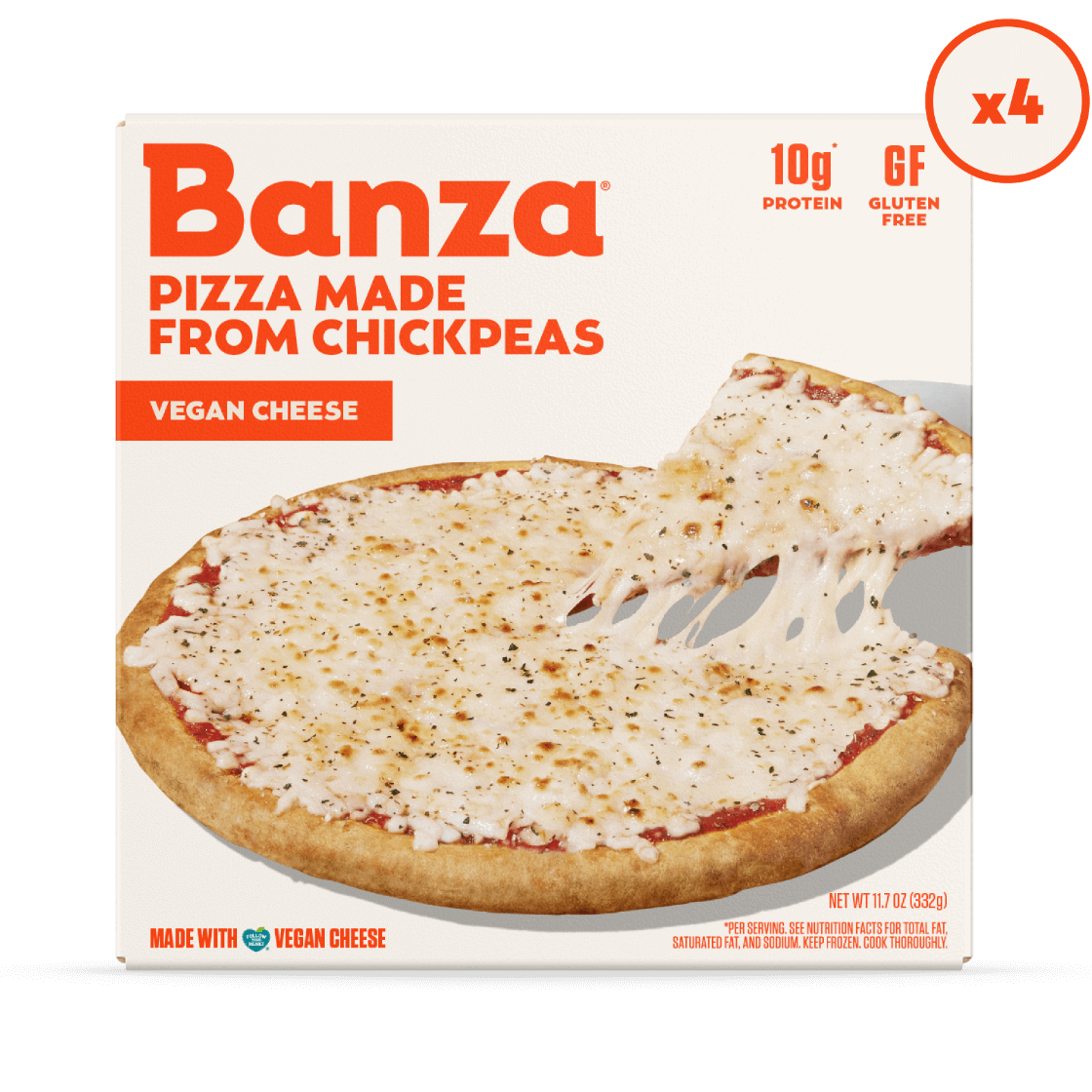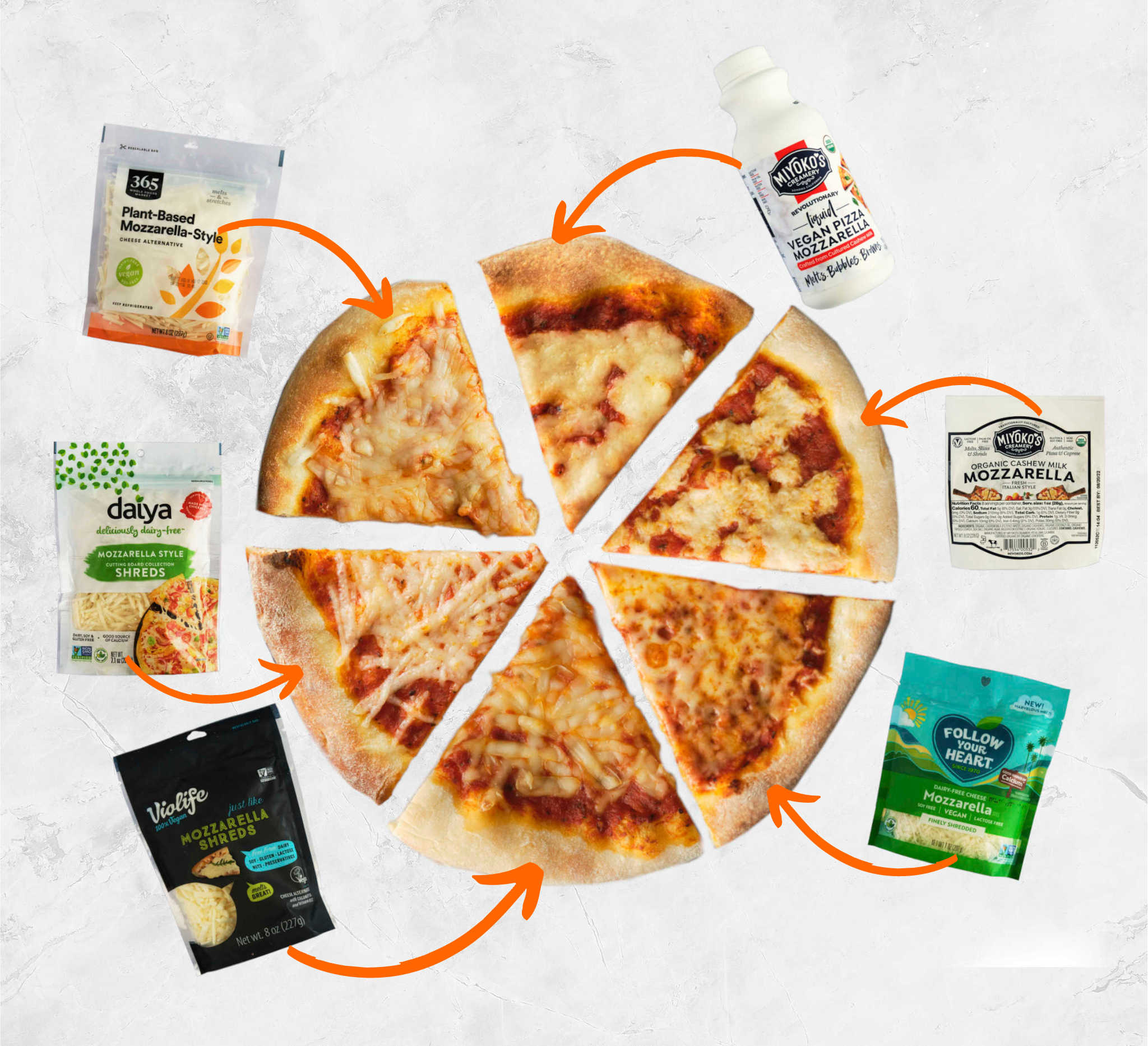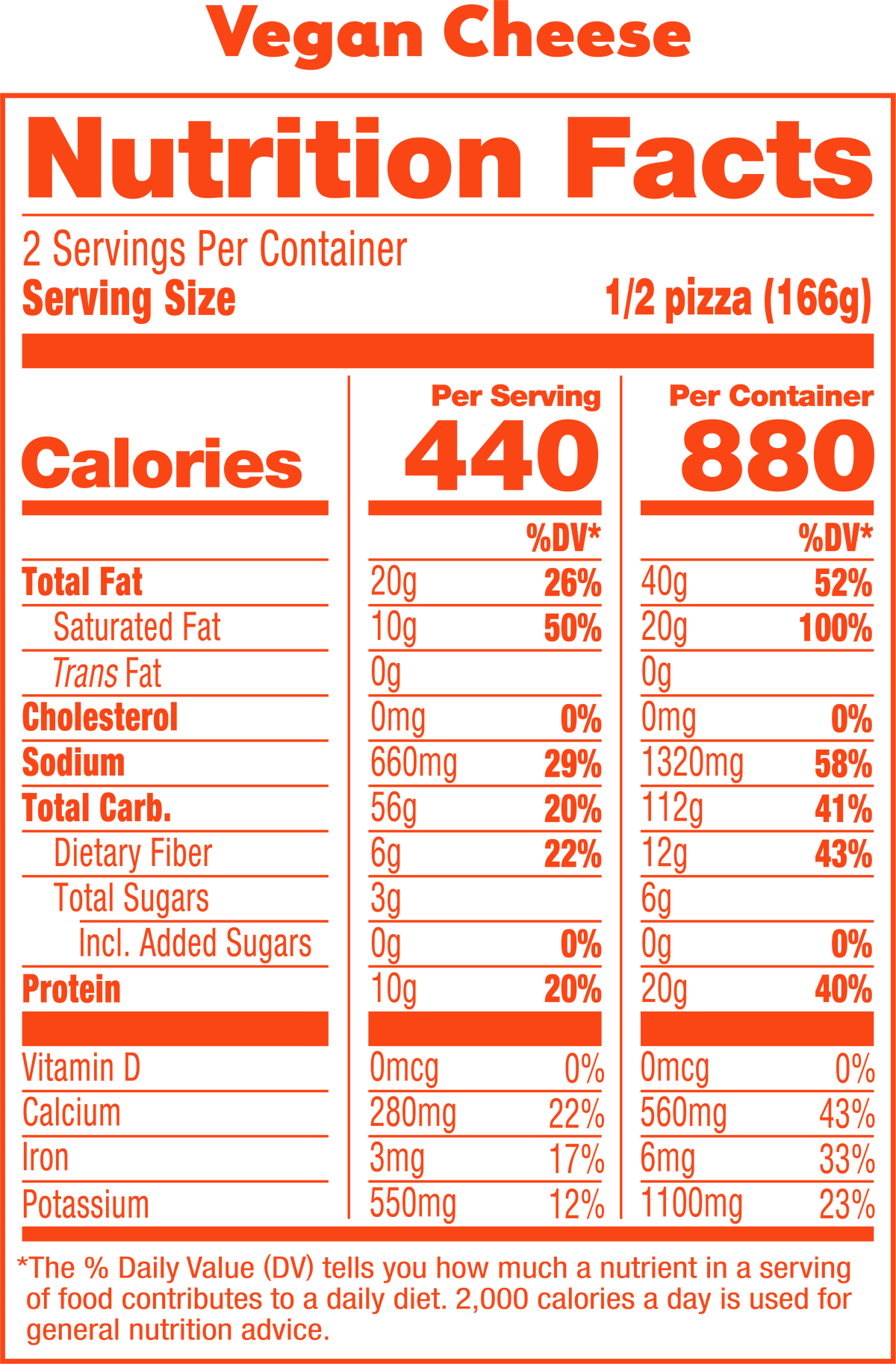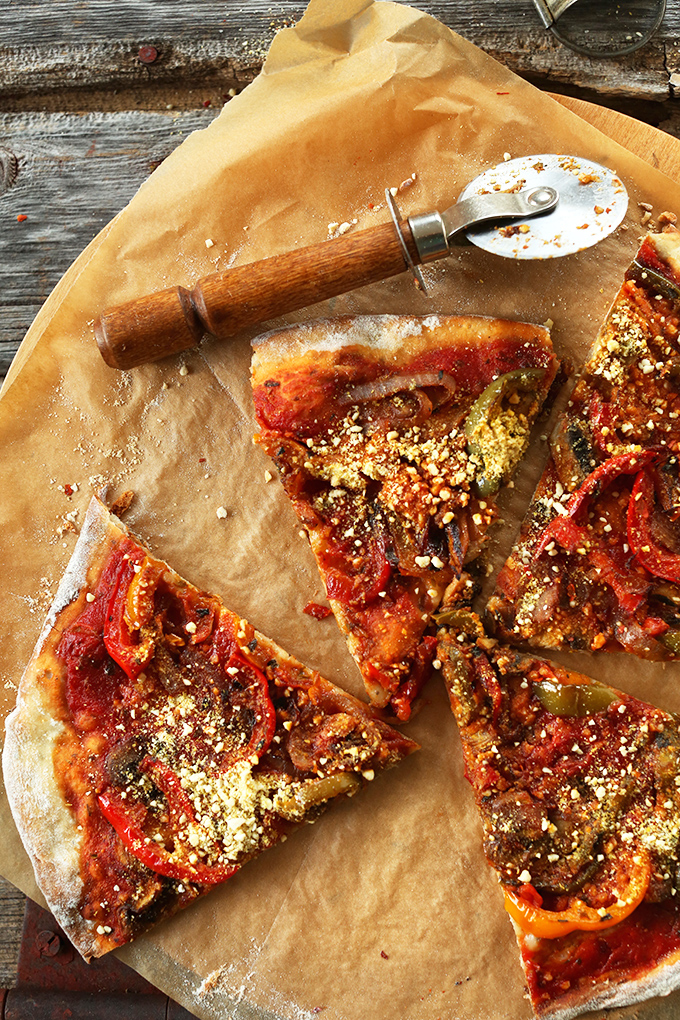Contents
- I. Introduction
- II. Understanding Dairy-Free Cheese Pizza
- III. Nutritional Profile of Dairy-Free Cheese Pizza
- IV. Health Benefits of Dairy-Free Cheese Pizza
- V. Potential Drawbacks of Dairy-Free Cheese Pizza
- VI. Comparing Dairy-Free Cheese Brands
- VII. Tips for Making Delicious Dairy-Free Cheese Pizza
- VIII. Frequently Asked Questions (FAQs)
- A. Is dairy-free cheese pizza suitable for vegans?
- B. Can dairy-free cheese pizza be frozen?
- C. How does the nutritional value of dairy-free cheese pizza compare to traditional cheese pizza?
- D. Are there any allergy concerns with dairy-free cheese pizza?
- E. Can dairy-free cheese pizza be made at home?
- F. What are some common dairy-free cheese alternatives for pizza?
- G. How does the cost of dairy-free cheese pizza compare to traditional cheese pizza?
- H. Are there any specific storage requirements for dairy-free cheese pizza?
- I. Can dairy-free cheese pizza be reheated?
- J. Are there any recommended toppings for dairy-free cheese pizza?
I. Introduction

Welcome to the world of dairy-free cheese pizza! Whether you’re lactose intolerant, following a vegan diet, or simply looking to reduce your dairy intake, dairy-free cheese pizza offers a delicious alternative that satisfies your cravings without compromising on taste. In this article, we will explore the nutritional pros and cons of dairy-free cheese pizza, helping you make an informed decision about incorporating it into your diet.
Dairy-free cheese pizza is made using plant-based alternatives to traditional dairy cheese. These alternatives are typically derived from nuts, soy, or other plant sources. They undergo a process that transforms them into a creamy, meltable, and flavorful substitute for dairy cheese.
One of the main advantages of dairy-free cheese pizza is its suitability for individuals with lactose intolerance. Lactose intolerance is a condition where the body lacks the enzyme needed to digest lactose, the sugar found in milk and dairy products. By opting for dairy-free cheese pizza, individuals with lactose intolerance can enjoy a cheesy pizza without experiencing uncomfortable digestive symptoms.
Furthermore, dairy-free cheese pizza is a great option for those following a vegan lifestyle. Vegans avoid all animal products, including dairy. By choosing dairy-free cheese pizza, vegans can still indulge in a classic comfort food without compromising their ethical beliefs.
While dairy-free cheese pizza offers many benefits, it’s important to be aware of its potential drawbacks. Some dairy-free cheese alternatives may contain higher levels of sodium and saturated fats compared to traditional dairy cheese. It’s essential to read labels and choose options that are lower in these components to maintain a balanced diet.
In the following sections, we will delve deeper into the nutritional aspects of dairy-free cheese pizza, exploring its protein content, vitamin and mineral profiles, and potential health benefits. So, let’s dive in and discover the wonders of dairy-free cheese pizza!
II. Understanding Dairy-Free Cheese Pizza

In this section, we will delve into the definition and composition of dairy-free cheese, as well as explore the various varieties of dairy-free cheese commonly used in pizza. As an experienced chef and a passionate advocate for dairy-free alternatives, I have had the opportunity to experiment with different dairy-free cheeses and understand their unique characteristics. Let’s dive in!
A. Definition and Composition of Dairy-Free Cheese
Dairy-free cheese is a plant-based alternative to traditional dairy cheese, specifically designed for individuals who are lactose intolerant, have dairy allergies, or follow a vegan lifestyle. It offers a cruelty-free and sustainable option for those who still crave the indulgence of cheese without compromising their dietary restrictions or ethical beliefs.
The composition of dairy-free cheese varies depending on the brand and type. However, most dairy-free cheeses are primarily made from plant-based ingredients such as nuts, seeds, legumes, or vegetables. These ingredients are blended with various seasonings, oils, and emulsifiers to create a cheese-like texture and flavor.
One of the key components in dairy-free cheese is the use of plant-based milk, such as almond milk, soy milk, or coconut milk. These milks provide the base for creating the creamy and melty consistency that is characteristic of traditional dairy cheese.
It’s important to note that while dairy-free cheese mimics the taste and texture of dairy cheese, it may not have the exact same flavor profile. However, with advancements in food technology, many dairy-free cheeses have come remarkably close to replicating the taste and texture of their dairy counterparts.
B. Varieties of Dairy-Free Cheese Used in Pizza
When it comes to dairy-free cheese used in pizza, there is a wide range of options available in the market. Each variety offers a unique taste and texture, allowing individuals to find the perfect dairy-free alternative that suits their preferences. Here are some popular varieties:
- 1. Cashew Cheese: Made from blended cashews, this variety of dairy-free cheese offers a rich and creamy texture. It melts beautifully and adds a subtle nutty flavor to the pizza.
- 2. Almond Cheese: Almond cheese is created by blending almonds with plant-based milk and seasonings. It has a slightly sweet and mild flavor, making it a versatile choice for various pizza toppings.
- 3. Soy Cheese: Soy cheese is made from soy milk and has a smooth and creamy texture. It has a mild flavor that pairs well with a variety of pizza toppings.
- 4. Coconut Cheese: Coconut cheese is derived from coconut milk and offers a unique tropical twist to pizza. It has a slightly sweet and savory taste, adding a delightful flavor to the overall dish.
- 5. Rice Cheese: Rice cheese is made from rice milk and has a mild and slightly tangy flavor. It has a firm texture and melts well, making it a suitable choice for pizza toppings.
These are just a few examples of the dairy-free cheese varieties commonly used in pizza. However, the market is constantly evolving, and new innovative options are emerging regularly. It’s always exciting to explore and experiment with different dairy-free cheeses to find the perfect match for your pizza cravings.
III. Nutritional Profile of Dairy-Free Cheese Pizza

A dairy-free cheese pizza is a delicious alternative for individuals who are lactose intolerant or follow a vegan diet. It offers a similar taste and texture to traditional cheese pizza, but without the dairy. In this section, we will explore the macronutrients and micronutrients found in dairy-free cheese pizza, highlighting its nutritional profile.
A. Macronutrients in dairy-free cheese pizza
1. Protein content:
Protein is an essential macronutrient that plays a crucial role in building and repairing tissues, supporting immune function, and promoting satiety. Dairy-free cheese pizza typically contains a good amount of protein, thanks to the plant-based cheese substitute used. The protein content can vary depending on the brand and type of cheese alternative, but it generally ranges from 10 to 15 grams per serving.
2. Fat content:
Fat provides energy, aids in the absorption of fat-soluble vitamins, and adds flavor to food. Dairy-free cheese pizza usually has a moderate fat content, which is derived from the plant-based cheese substitute and any added oils used in the crust or toppings. The fat content can vary, but it typically ranges from 10 to 15 grams per serving.
3. Carbohydrate content:
Carbohydrates are the body’s primary source of energy. In dairy-free cheese pizza, the carbohydrate content mainly comes from the crust and any added toppings like vegetables or fruits. The carbohydrate content can vary depending on the crust type and toppings used, but it generally ranges from 30 to 40 grams per serving.
B. Micronutrients in dairy-free cheese pizza
1. Calcium:
Calcium is an essential mineral that plays a vital role in maintaining strong bones and teeth, supporting muscle function, and aiding in nerve transmission. While dairy-free cheese pizza does not contain dairy, which is a primary source of calcium, some brands fortify their cheese alternatives with calcium to ensure an adequate intake. The calcium content can vary depending on the brand, but it typically ranges from 100 to 200 milligrams per serving.
2. Vitamin B12:
Vitamin B12 is crucial for the production of red blood cells, DNA synthesis, and nerve function. It is primarily found in animal-based products, making it a nutrient of concern for individuals following a vegan or dairy-free diet. Some brands of dairy-free cheese pizza fortify their cheese alternatives with vitamin B12 to address this nutritional gap. The vitamin B12 content can vary, but it typically ranges from 0.5 to 1.5 micrograms per serving.
3. Vitamin D:
Vitamin D is essential for bone health, immune function, and overall well-being. It is primarily synthesized in the body through exposure to sunlight, but it can also be obtained from dietary sources. Some brands of dairy-free cheese pizza fortify their cheese alternatives with vitamin D to ensure an adequate intake. The vitamin D content can vary depending on the brand, but it typically ranges from 0 to 2 micrograms per serving.
IV. Health Benefits of Dairy-Free Cheese Pizza

Dairy-free cheese pizza offers several health benefits, making it a suitable option for individuals who are lactose intolerant or looking to reduce their intake of saturated fat and cholesterol. Here are some of the key health benefits of opting for dairy-free cheese pizza:
A. Suitable for lactose intolerant individuals
One of the primary advantages of dairy-free cheese pizza is that it is suitable for individuals who are lactose intolerant. Lactose intolerance is a condition where the body lacks the enzyme lactase, which is responsible for breaking down lactose, the sugar found in milk and dairy products. Consuming dairy products can lead to digestive issues such as bloating, gas, and diarrhea for individuals with lactose intolerance.
By choosing dairy-free cheese pizza, lactose intolerant individuals can enjoy a delicious pizza without experiencing any discomfort or digestive issues. Dairy-free cheese is typically made from plant-based ingredients such as nuts, soy, or coconut, which do not contain lactose. This makes it a safe and suitable alternative for those who are unable to tolerate lactose.
B. Lower in saturated fat compared to traditional cheese pizza
Another benefit of dairy-free cheese pizza is that it is lower in saturated fat compared to traditional cheese pizza. Saturated fat is a type of fat that is found in animal-based products, including dairy products. Consuming high amounts of saturated fat has been linked to an increased risk of heart disease and other health issues.
By opting for dairy-free cheese pizza, individuals can reduce their intake of saturated fat while still enjoying a flavorful and satisfying meal. Plant-based cheese alternatives used in dairy-free pizzas are often lower in saturated fat and contain healthier fats, such as monounsaturated and polyunsaturated fats.
C. Potential reduction in cholesterol intake
Choosing dairy-free cheese pizza can also lead to a potential reduction in cholesterol intake. Cholesterol is a fatty substance found in animal-based foods, including dairy products. High levels of cholesterol in the blood can contribute to the development of heart disease and other cardiovascular problems.
By eliminating dairy cheese from pizza and opting for dairy-free alternatives, individuals can significantly reduce their cholesterol intake. Plant-based cheese substitutes used in dairy-free pizzas are typically cholesterol-free, making them a healthier choice for those concerned about their heart health.
V. Potential Drawbacks of Dairy-Free Cheese Pizza
:max_bytes(150000):strip_icc()/what-is-a-dairy-free-diet-1324040-a-b4584dc50c3f4f1784ed9a40ce8281d3.jpg)
While dairy-free cheese pizza offers a suitable alternative for individuals with lactose intolerance or those following a vegan diet, there are some potential drawbacks to consider. It’s important to be aware of these factors before making a decision to incorporate dairy-free cheese pizza into your regular diet.
A. Higher sodium content in some dairy-free cheese alternatives
One potential drawback of dairy-free cheese pizza is the higher sodium content found in some dairy-free cheese alternatives. Sodium is often used as a flavor enhancer and preservative in these products, which can lead to an increased intake of sodium.
Excessive sodium consumption has been linked to various health issues, including high blood pressure, heart disease, and stroke. Therefore, individuals who are watching their sodium intake should be cautious when consuming dairy-free cheese pizza and opt for brands or products with lower sodium content.
B. Limited availability of certain nutrients
Another potential drawback of dairy-free cheese pizza is the limited availability of certain nutrients. Traditional cheese is a good source of calcium and protein, which are essential for maintaining strong bones and muscles.
While some dairy-free cheese alternatives are fortified with calcium and other nutrients, they may not provide the same level of nutritional value as traditional cheese. It’s important for individuals who rely on dairy-free cheese pizza as a regular part of their diet to ensure they are getting adequate amounts of these nutrients from other sources.
C. Taste and texture differences compared to traditional cheese
Lastly, taste and texture differences compared to traditional cheese can be a potential drawback of dairy-free cheese pizza. Dairy-free cheese alternatives often have a different taste and texture profile compared to traditional cheese, which may not appeal to everyone’s palate.
Some individuals may find the taste and texture of dairy-free cheese to be less satisfying or less similar to the real thing. It may take some experimentation to find a dairy-free cheese alternative that closely matches the taste and texture of traditional cheese.
VI. Comparing Dairy-Free Cheese Brands
When it comes to dairy-free cheese, there are numerous brands available in the market. As someone who has been on a dairy-free diet for several years, I have tried various dairy-free cheese brands and have developed my favorites. In this section, I will compare some of the top dairy-free cheese brands based on taste, texture, meltability, and overall quality.
1. Violife
Violife is a well-known brand in the dairy-free cheese market. They offer a wide range of flavors, including cheddar, mozzarella, and feta. One of the things I love about Violife is its creamy texture, which closely resembles real cheese. The taste is also quite similar to dairy cheese, making it a great option for those transitioning to a dairy-free diet. Violife cheese melts beautifully and can be used in various dishes like pizza, grilled cheese sandwiches, and pasta.
2. Daiya
Daiya is another popular brand that offers a wide variety of dairy-free cheese products. Their cheese is made from a blend of plant-based ingredients, including tapioca starch and coconut oil. Daiya cheese is known for its stretchy and gooey texture, making it an excellent choice for dishes like macaroni and cheese. The taste is slightly different from dairy cheese, but it still provides a satisfying cheesy flavor. Daiya also offers different flavors like pepperjack and smoked gouda, catering to various taste preferences.
3. Follow Your Heart
Follow Your Heart is a brand that focuses on creating high-quality dairy-free and vegan products. Their dairy-free cheese is made from a base of coconut oil and potato starch, resulting in a creamy and flavorful product. Follow Your Heart cheese has a mild taste that is similar to dairy cheese, and it melts well. They offer a range of flavors, including American, provolone, and pepperjack. Follow Your Heart cheese is versatile and can be used in sandwiches, wraps, and salads.
4. Miyoko’s Creamery
Miyoko’s Creamery is known for its artisanal dairy-free cheese made from cashews and other plant-based ingredients. Their cheese has a rich and creamy texture, similar to traditional dairy cheese. Miyoko’s Creamery offers a variety of flavors, including mozzarella, cheddar, and pepper jack. One of the unique aspects of Miyoko’s cheese is its complex flavors, which are achieved through the fermentation process. This brand is a great option for those looking for a gourmet dairy-free cheese experience.
5. Kite Hill
Kite Hill specializes in dairy-free products made from almond milk. Their cheese has a smooth and creamy texture, similar to soft dairy cheese. Kite Hill offers a range of flavors, including ricotta, cream cheese, and chive. Their cheese has a mild and slightly tangy taste, making it a versatile option for various dishes. Kite Hill cheese is great for spreading on crackers, adding to pasta dishes, or using as a filling in stuffed vegetables.
It’s important to note that taste preferences can vary, and what works for one person may not work for another. I recommend trying different dairy-free cheese brands to find the ones that suit your taste and dietary needs. Additionally, it’s worth mentioning that the availability of these brands may vary depending on your location, so it’s always a good idea to check with local grocery stores or online retailers.
VII. Tips for Making Delicious Dairy-Free Cheese Pizza
When it comes to making a delicious dairy-free cheese pizza, there are a few key tips and techniques that can help you achieve optimal results. Whether you are lactose intolerant, following a vegan diet, or simply looking to reduce your dairy intake, these tips will ensure that your pizza is flavorful, cheesy, and satisfying.
A. Choosing the right dairy-free cheese for pizza
One of the most important aspects of making a dairy-free cheese pizza is choosing the right cheese alternative. With so many options available on the market, it can be overwhelming to find the perfect one. However, by considering a few factors, you can make an informed decision.
Firstly, look for a dairy-free cheese that melts well. This is crucial for achieving that gooey, stretchy texture that we all love on a pizza. Some popular options include almond-based cheese, cashew-based cheese, and soy-based cheese. These alternatives often have a similar texture to traditional cheese and melt beautifully when baked.
Secondly, consider the flavor profile of the cheese. Different brands offer a variety of flavors, ranging from mild and creamy to sharp and tangy. Experiment with different options to find the one that suits your taste preferences. Some popular flavors include mozzarella-style, cheddar-style, and pepper jack-style.
Lastly, read reviews and recommendations from other users and experts. This can give you valuable insights into the taste, texture, and overall quality of the cheese. Look for brands that have positive feedback and a reputation for producing high-quality dairy-free cheese.
B. Enhancing flavor with herbs and spices
While the dairy-free cheese is the star of the show, adding herbs and spices can take your pizza to the next level in terms of flavor. Here are a few suggestions to enhance the taste of your dairy-free cheese pizza:
- Sprinkle dried oregano, basil, and thyme on top of the cheese before baking. These classic Italian herbs add a burst of freshness and aroma to the pizza.
- Add minced garlic or garlic powder for a savory kick. Garlic pairs well with the flavors of tomato sauce and cheese, giving your pizza a delicious depth of flavor.
- Experiment with different spice blends, such as Italian seasoning, Cajun seasoning, or smoked paprika. These blends can add a unique twist to your pizza and elevate the overall taste.
- For a hint of heat, sprinkle some crushed red pepper flakes on top. This will add a subtle spiciness that complements the other flavors.
Feel free to get creative with your herb and spice combinations. The key is to balance the flavors and enhance the overall taste of the pizza.
C. Baking techniques for optimal results
The way you bake your dairy-free cheese pizza can make a big difference in the final outcome. Follow these baking techniques to achieve a crispy crust and perfectly melted cheese:
- Preheat your oven to a high temperature, typically around 450°F (230°C) or higher. This will ensure that the pizza cooks quickly and evenly.
- Use a pizza stone or a baking sheet lined with parchment paper. This will help distribute the heat evenly and prevent the pizza from sticking.
- For a crispy crust, pre-bake the pizza dough for a few minutes before adding the toppings. This will help prevent a soggy crust.
- Spread a thin layer of tomato sauce on the dough, leaving a small border around the edges. This will prevent the pizza from becoming too soggy.
- Sprinkle a generous amount of dairy-free cheese on top of the sauce. Make sure to cover the entire surface of the pizza for a cheesy bite in every slice.
- Bake the pizza in the preheated oven for the recommended time, usually around 10-15 minutes. Keep an eye on it to prevent burning.
- Once the cheese is melted and bubbly, remove the pizza from the oven and let it cool for a few minutes before slicing and serving.
By following these baking techniques, you can achieve a perfectly cooked dairy-free cheese pizza with a crispy crust and gooey cheese.
Remember, making a delicious dairy-free cheese pizza is all about finding the right cheese alternative, enhancing the flavor with herbs and spices, and using proper baking techniques. With a little experimentation and creativity, you can enjoy a mouthwatering pizza that is both dairy-free and satisfying.
VIII. Frequently Asked Questions (FAQs)
A. Is dairy-free cheese pizza suitable for vegans?
Yes, dairy-free cheese pizza is suitable for vegans. Unlike traditional cheese pizza, which is made from animal milk, dairy-free cheese pizza is made from plant-based ingredients. It is a great option for those following a vegan diet or those who are lactose intolerant. Dairy-free cheese is typically made from nuts, soy, or other plant-based ingredients, and it can provide a similar taste and texture to traditional cheese.
B. Can dairy-free cheese pizza be frozen?
Yes, dairy-free cheese pizza can be frozen. Just like traditional cheese pizza, you can freeze dairy-free cheese pizza for later consumption. It is important to wrap the pizza tightly in plastic wrap or place it in an airtight container before freezing to prevent freezer burn. When you’re ready to enjoy the pizza, simply thaw it in the refrigerator and reheat it in the oven or microwave.
C. How does the nutritional value of dairy-free cheese pizza compare to traditional cheese pizza?
The nutritional value of dairy-free cheese pizza can vary depending on the brand and ingredients used. In general, dairy-free cheese pizza tends to be lower in saturated fat and cholesterol compared to traditional cheese pizza. However, it may also be lower in protein and calcium, as dairy-free cheese is typically made from plant-based sources. It’s important to read the nutrition labels and choose dairy-free cheese pizzas that are fortified with calcium and other essential nutrients.
D. Are there any allergy concerns with dairy-free cheese pizza?
Dairy-free cheese pizza can be a great option for individuals with dairy allergies or lactose intolerance. However, it’s important to note that some dairy-free cheese alternatives may contain allergens such as nuts or soy. If you have specific allergies, it’s important to carefully read the ingredient labels and choose dairy-free cheese pizzas that are free from your allergens. Additionally, cross-contamination can occur during the manufacturing process, so it’s important to check if the pizza is produced in a facility that also processes dairy products.
E. Can dairy-free cheese pizza be made at home?
Yes, dairy-free cheese pizza can be made at home. There are many recipes available online that provide instructions on how to make dairy-free cheese from scratch using ingredients like cashews, nutritional yeast, and plant-based milk. You can then use this homemade dairy-free cheese to top your pizza. Alternatively, there are also pre-made dairy-free cheese options available in stores that you can use to make your own dairy-free cheese pizza.
F. What are some common dairy-free cheese alternatives for pizza?
There are several common dairy-free cheese alternatives that can be used for pizza. Some popular options include:
- Almond cheese
- Soy cheese
- Cashew cheese
- Coconut milk-based cheese
- Rice cheese
These alternatives are made from plant-based ingredients and can provide a similar taste and texture to traditional cheese when melted on a pizza.
G. How does the cost of dairy-free cheese pizza compare to traditional cheese pizza?
The cost of dairy-free cheese pizza can vary depending on the brand and where you purchase it. In general, dairy-free cheese products tend to be slightly more expensive than traditional cheese products. This is because the production process and ingredients used in dairy-free cheese alternatives can be more costly. However, the price difference may not be significant, and it’s important to consider the health and dietary benefits of dairy-free cheese when comparing costs.
H. Are there any specific storage requirements for dairy-free cheese pizza?
Dairy-free cheese pizza should be stored in the refrigerator to maintain its freshness. It’s important to follow the storage instructions provided by the manufacturer. Typically, dairy-free cheese pizzas should be kept in an airtight container or wrapped tightly in plastic wrap to prevent them from drying out or absorbing odors from other foods in the refrigerator.
I. Can dairy-free cheese pizza be reheated?
Yes, dairy-free cheese pizza can be reheated. To reheat a dairy-free cheese pizza, preheat your oven to a moderate temperature (around 350°F or 180°C) and place the pizza on a baking sheet. Heat the pizza for about 10-15 minutes or until the cheese is melted and the crust is crispy. You can also reheat individual slices in the microwave for a quick and convenient option.
J. Are there any recommended toppings for dairy-free cheese pizza?
There are countless delicious toppings that can be added to dairy-free cheese pizza. Some popular options include:
- Fresh vegetables like tomatoes, bell peppers, onions, and mushrooms
- Plant-based proteins like tofu, tempeh, or seitan
- Herbs and spices for added flavor, such as basil, oregano, or garlic
- Olives, artichoke hearts, or sun-dried tomatoes for a Mediterranean twist
- Plant-based meats like vegan sausage or pepperoni
Feel free to get creative and experiment with different toppings to customize your dairy-free cheese pizza to your liking.

